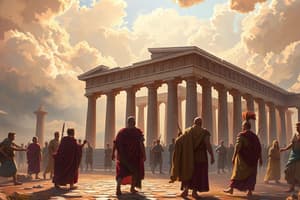Podcast
Questions and Answers
True or false: The Roman Empire included territory in Europe, North Africa, and Western Asia?
True or false: The Roman Empire included territory in Europe, North Africa, and Western Asia?
True (A)
True or false: The adoption of Christianity as the state church in 380 marked the end of classical antiquity?
True or false: The adoption of Christianity as the state church in 380 marked the end of classical antiquity?
True (A)
True or false: Rome expanded its rule to most of the Mediterranean and beyond?
True or false: Rome expanded its rule to most of the Mediterranean and beyond?
True (A)
True or false: Octavian became the first Roman emperor after defeating Mark Antony and Cleopatra at the Battle of Actium?
True or false: Octavian became the first Roman emperor after defeating Mark Antony and Cleopatra at the Battle of Actium?
Signup and view all the answers
True or false: The Roman Empire was organized in senatorial and imperial provinces?
True or false: The Roman Empire was organized in senatorial and imperial provinces?
Signup and view all the answers
Which event marked the end of classical antiquity and the beginning of the Middle Ages?
Which event marked the end of classical antiquity and the beginning of the Middle Ages?
Signup and view all the answers
What title was granted to Octavian after his victory at the Battle of Actium?
What title was granted to Octavian after his victory at the Battle of Actium?
Signup and view all the answers
How were the Roman territories organized?
How were the Roman territories organized?
Signup and view all the answers
What were the two main factors that destabilized Rome before Octavian's victory at the Battle of Actium?
What were the two main factors that destabilized Rome before Octavian's victory at the Battle of Actium?
Signup and view all the answers
When did Christianity become the state church of the Roman Empire?
When did Christianity become the state church of the Roman Empire?
Signup and view all the answers
Study Notes
The Roman Empire
- The Roman Empire included territory in Europe, North Africa, and Western Asia.
Expansion of the Roman Empire
- Rome expanded its rule to most of the Mediterranean and beyond.
The Rise of Octavian
- Octavian became the first Roman emperor after defeating Mark Antony and Cleopatra at the Battle of Actium.
- The title of Augustus was granted to Octavian after his victory at the Battle of Actium.
Organization of Roman Territories
- The Roman Empire was organized into senatorial and imperial provinces.
The End of Classical Antiquity
- The adoption of Christianity as the state church in 380 marked the end of classical antiquity and the beginning of the Middle Ages.
Pre-Octavian Instability
- Civil wars and internal power struggles were the two main factors that destabilized Rome before Octavian's victory at the Battle of Actium.
Christianity in the Roman Empire
- Christianity became the state church of the Roman Empire in 380.
Studying That Suits You
Use AI to generate personalized quizzes and flashcards to suit your learning preferences.
Description
Test your knowledge about the Roman Empire and its vast influence on ancient Europe, North Africa, and Western Asia. Explore the rise and fall of this powerful civilization, from the adoption of Christianity to the end of classical antiquity. Find out how Rome expanded its rule and shaped the course of history.




